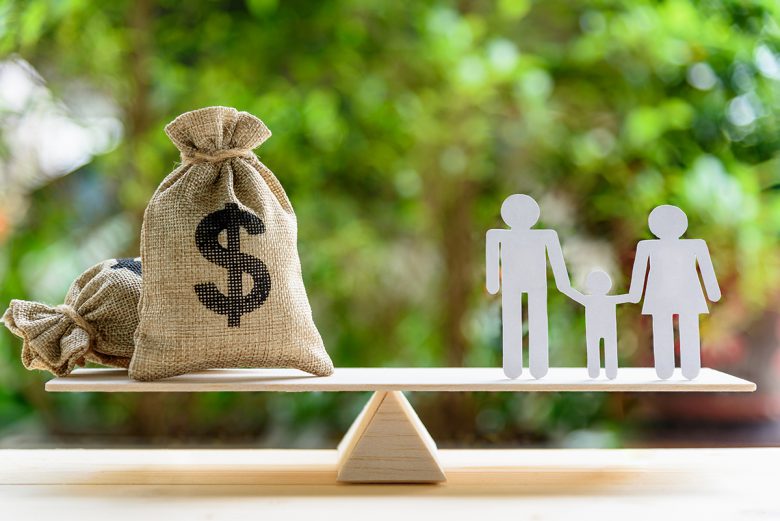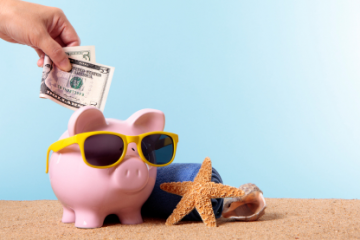When becoming parents for the first time, there are a number of purchases you’ll need to budget for. Just bringing your baby into the world can be expensive and shopping will become a regular part of your routine. On top of medical costs, you’ll have to cover the cost of some major, ongoing and unexpected expenses.
Major and ongoing expenses
House
With a baby coming into your life, you might be planning on moving to a new and bigger house. This is obviously a major expense you need to budget for, and it’s likely you’ll have to start saving for it well before you even start trying for a baby, so keep that in mind.
Nappies
Whether you’re using cloth-based or disposables, you’ll be amazed by the number of nappies you go through in a year. With cloth nappies there’s the initial purchase cost and ongoing cleaning costs, and with disposable nappies the costs keep on coming. The average disposable nappy costs around 70 cents. Times that by 8-12 nappies per 24-hour period and the cost quickly adds up. You could be looking at more than $2,000 a year just on nappies, plus you’ll need wipes and wash cloths for cleaning tiny tushies!
Toys
Babies need stimulation, and specially-designed toys can help advance baby’s learning and development. Brightly coloured mobiles, stuffed animals to cuddle, blocks to build up and knock down, soft books and activity centres with gadgets to turn, grasp, open and close are just some of the toys you’ll need.
Car seat
A certified safe car seat is a requirement, but they can be expensive. A good idea is to invest in a convertible car seat that will grow with your child. They’re more expensive in the beginning, but are worth it in the long run – staying with your child while they’re a toddler and beyond.
Pram
While it’s possible to pick up a second-hand pram, a new pram will set you back anywhere from $200 to $2,000. The average amount spent on a pram in Australia is $539. A few months in you might also like to purchase a stroller for short trips out and about.
Clothing
Many new parents save money by receiving second-hand clothes from family and friends, or clothes gifted at a baby shower. Even so, you’ll likely face some clothing costs. Babies go through clothes at a rapid rate, both due to mess and through growing. Plus, there will be special occasions where you just can’t resist buying something ridiculously cute.
Unexpected costs
You’ll also have costs that you don’t necessarily factor in when planning for a baby, such as:
Child care
Gone are the days when it could be assumed that Mum will stay at home and look after their baby full-time. According to the Australian Bureau of Statistics, 21% of couples with children aged 0-4 years are both working full-time, and 70% of mothers are employed in some way. With employment comes child care costs.
Breastfeeding
Breastfeeding itself may be free, but there are still associated expenses. You’ll need nursing bras and tops, a breast pump, bottles, a feeding shawl and feeding pillow. If you’re combining breastfeeding with formula feeding these costs increase further, and from six months on you’ll be spending money on baby food, a high chair and many bibs.
Convenience food
On top of another mouth to feed, you should also aim to factor in the cost of convenience food. You may envision healthy home-cooked meals every night, but the reality is there will be days when you struggle to find the time to put food on the table. A baby that’s fussy in the afternoons could have you reaching for those more-expensive convenience foods more often than you think.
Loss of income
Whether you plan on returning to work after six weeks or you plan to stay at home full-time, there will ultimately be some loss of income. Some new parents will be lucky enough to receive maternity or paternity pay, but even this can be a fraction of the amount normally earnt. For those working, they’ll be more reluctant to take up opportunities for overtime and side hustles.
Life insurance
Before kids, the idea of life insurance may seem unimportant. But once you have a child, you start to ask yourself what would happen if you suddenly became ill or had an accident. Life insurance costs vary according to the specifics of your plan, but they should be considered.
Baby gear
As your baby grows, you’ll find there’s a constant need for new items like baby swings, baby gates, baby slings, floor seats, baby bouncers, night lights… the list goes on. Even if you think your baby shower will cover all the baby gear, you’ll inevitably end up needing to buy additional items.
Replacements
Your new baby can hardly raise their head, so surely they can’t do damage. Wrong! Babies can stretch the neckline of your favourite top. They can slobber all over your iPhone or practice their throwing technique with it. They can vomit on just about every surface, lose a dummy in a heartbeat, and drop toys out of the pram. So you’ll need to be prepared for some replacement shopping.
Need help with your baby budget?
Worried you don’t have the budget to properly welcome your little one into this world? Apply for a cash advancement or personal loan with SRG Finance. We’re a registered National Credit Provider with a specific focus on providing short term personal finance solutions to you when you need it.



